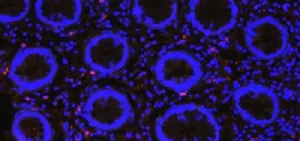(Press-News.org) Starting today, people with Parkinson’s disease will have a new treatment option, thanks to U.S. Food and Drug Administration approval of groundbreaking new technology.
The therapy, known as adaptive deep brain stimulation, or aDBS, uses an implanted device that continuously monitors the brain for signs that Parkinson’s symptoms are developing. When it detects specific patterns of brain activity, it delivers precisely calibrated electric pulses to keep symptoms at bay.
The FDA approval covers two treatment algorithms that run on a device made by Medtronic, a medical device company. Both work by monitoring the same part of the brain, called the subthalamic nucleus. But they respond in different ways.
A “fast” algorithm detects patterns associated with symptoms and immediately suppresses them. A “slow” algorithm provides stimulation that maintains the person’s brain activity within a range where symptoms are reduced.
The fast approach was developed by UC San Francisco neurologist Simon Little, MBBS, PhD, in 2013, while he was a Wellcome Trust clinical research fellow at Oxford University with Peter Brown, MBBS.
aDBS is a significant advancement over a treatment called continuous DBS, or cDBS, which delivers constant stimulation to the brain. cDBS has been used to improve Parkinson’s symptoms since it was approved by the FDA in 1999.
aDBS, unlike cDBS, can sense and adjust when a patient’s brain activity changes, which often happens when people with Parkinson’s take their medications. aDBS’s constant monitoring also enables it to smooth out the peaks and valleys of brain activity, fending off symptoms like stiffness and involuntary movements before they arise.
Patients and their health care providers will be able to choose which adaptive algorithm to use and be able to easily switch from one to the other using software that communicates with the device via Bluetooth.
As the algorithms are more widely used, clinicians will get more insight into how different patients experience them. They may be able to prescribe one or the other based on their knowledge of the patient.
“The early adaptive DBS algorithms approved today are just the first step in what’s possible,” said Little.
Soon, round-the-clock Parkinson’s care
Since coming to UCSF in 2019, Little has continued to developed and test even newer aDBS algorithms for treating motor symptoms like stiffness and tremors as well as non-motor symptoms like mood dysfunction and insomnia that people with Parkinson’s experience.
In a study published last August, Little and neurosurgeon Philip Starr, MD, PhD, designed an algorithm that monitors and responds to brain signals in the cerebral cortex. This is a different brain region than was targeted by the two algorithms approved by the FDA. The new algorithm and location improved symptoms and reduced side effects better than cDBS.
The UCSF effort was the first “double-blind” trial of aDBS. That means participants went about their lives at home while the algorithms were changed, and neither they nor the researchers knew what settings were in place at a given time.
The UCSF team’s algorithm is more complex than those approved by the FDA on Monday. The researchers are still developing the approach, but it has improved quality of life for participants in a small clinical trial, even allowing a former pro skateboarder to return to his sport.
Little anticipates that in the future, artificial intelligence will make it easier to customize the algorithms. Future technology will also address other Parkinson’s symptoms, like depression and sleep dysfunction.
“We’ll be able to give people with Parkinson’s round-the-clock personalized DBS therapy,” he said.
Researchers at UCSF are exploring how to use personalized DBS for depression, chronic pain and obsessive-compulsive disorder. Today’s approval gives momentum to the development of DBS to treat those conditions as well.
About UCSF: The University of California, San Francisco (UCSF) is exclusively focused on the health sciences and is dedicated to promoting health worldwide through advanced biomedical research, graduate-level education in the life sciences and health professions, and excellence in patient care. UCSF Health, which serves as UCSF's primary academic medical center, includes top-ranked specialty hospitals and other clinical programs, and has affiliations throughout the Bay Area. UCSF School of Medicine also has a regional campus in Fresno. Learn more at ucsf.edu, or see our Fact Sheet.
###
Follow UCSF
ucsf.edu | Facebook.com/ucsf | YouTube.com/ucsf
END
This new treatment can adjust to Parkinson's symptoms in real time
2025-02-24
ELSE PRESS RELEASES FROM THIS DATE:
Bigger animals get more cancer, defying decades-old belief
2025-02-24
Elephants, giraffes, pythons and other large species have higher cancer rates than smaller ones like mice, bats, and frogs, a new study has shown, overturning a 45-year-old belief about cancer in the animal kingdom.
The research, conducted by researchers from the University of Reading, University College London and The Johns Hopkins University School of Medicine, examined cancer data from 263 species across four major animal groups - amphibians, birds, mammals and reptiles. The findings challenge "Peto's paradox," a longstanding idea based on observations from 1977 that suggested ...
As dengue spreads, researchers discover a clue to fighting the virus
2025-02-24
LA JOLLA, CA—Children who experience multiple cases of dengue virus develop an army of dengue-fighting T cells, according to a new study led by scientists at La Jolla Institute for Immunology (LJI).
The findings, published recently in JCI Insights, suggest that these T cells are key to dengue virus immunity. In fact, most children who experienced two or more dengue infections showed very minor symptoms—or no symptoms at all—when they caught the virus again.
"We saw a significant T cell response in children who had been infected more than once before," says study leader and LJI Assistant Professor Daniela Weiskopf, Ph.D.
Dengue virus infects up ...
Teaming up tiny robot swimmers to transform medicine
2025-02-24
Smart artificial microswimmers—small robots that resemble microorganisms like bacteria or human sperm—could potentially be used for targeted drug delivery, minimally invasive surgery, and even in fertility treatments.
These types of complicated tasks won’t be accomplished by a single microswimmer. Multiple swimmers will be necessary; however, it’s unclear how such groups will move within the chemically and mechanically complex environment of the body’s fluids.
“We know that whenever a swimmer has a neighbor, it swims differently,” says Ebru Demir, an assistant ...
The Center for Open Science welcomes Daniel Correa and Amanda Kay Montoya to its Board of Directors
2025-02-24
(Charlottesville, VA, Feb. 24, 2025) –
The Center for Open Science (COS) is pleased to announce the appointment of Daniel Correa, Chief Executive Officer of the Federation of American Scientists, and Amanda Montoya, Associate Professor of Quantitative Psychology at UCLA, to the COS Board of Directors. Both will serve three-year terms from 2025 to 2027, bringing valuable expertise in science policy, innovation, research methodology, and open science advocacy.
Daniel Correa is the Chief Executive Officer of the Federation of American Scientists, ...
Research suggests common viral infection worsens deadly condition among premature babies
2025-02-24
FOR IMMEDIATE RELEASE
Researchers say they found that infection with a common virus that can be transmitted from mother to fetus before birth significantly worsens an often-fatal complication of premature birth called necrotizing enterocolitis (NEC) in experiments with mice.
The research team, led by Johns Hopkins Children’s Center investigators and funded by the National Institutes of Health, says the new findings advance the search for better treatments for NEC — a relatively rare condition, but still the most common emergency intestinal complication in preemies.
A report on the study published Feb. 13 in Cellular and Molecular Gastroenterology ...
UC Irvine scientists invent new drug candidates to treat antibiotic-resistant bacteria
2025-02-24
Irvine, Calif., Feb. 24, 2025 — There’s an arms race in medicine – scientists design drugs to treat lethal bacterial infections, but bacteria can evolve defenses to those drugs, sending the researchers back to square one. In the Journal of the American Chemical Society, a University of California, Irvine-led team describes the development of a drug candidate that can stop bacteria before they have a chance to cause harm.
“The issue with antibiotics is this crisis of antibiotic ...
A history of isolation and alcohol use may impact depression treatment
2025-02-24
Ketamine can effectively treat depression, but whether depressed patients with alcohol use disorder can safely use ketamine repeatedly remains unclear clinically. To investigate this possibility, Mohamed Kabbaj and colleagues from Florida State University modeled aspects of human depression in rats using long-term isolation and assessed how isolation and alcohol exposure alter ketamine intake. The authors found that a history of isolation and alcohol use influence the rewarding properties of ketamine in a sex-dependent manner.
Female rats took ketamine more than males in general. Prior alcohol use increased female rat ketamine ...
A new strategy to promote healthy food choices
2025-02-24
Poor food decisions and eating habits can contribute to excessive weight gain and health problems. Nutritional labels meant to convey healthiness instead may create negative expectations about taste or pose as a time-constraining hurdle for shoppers. Doris Schicker and Jessica Freiherr, from the Fraunhofer Institute for Process Engineering and Packaging, led a study in JNeurosci to explore whether pairing food labels with a sensory stimulus, like odor, affects how people perceive foods and thus promotes healthy shopping. ...
Report reveals high levels of added sugar in US infant formula despite medical recommendations
2025-02-24
LAWRENCE — Added sugar, derived from cheap crops like corn, is bad for babies.
According to the American Heart Association, added sugars are full of energy but lack nutritional value, boosting odds of obesity, type 2 diabetes, cardiovascular disease and other health problems.
But a study published today from the University of Kansas in the Journal of Food Composition and Analysis shows most infant formulas on the U.S. market contain primarily added sugars rather than the healthier, naturally occurring lactose found in cow-milk base that would be best for babies because ...
Arctic study urges stronger climate action to prevent catastrophic warming
2025-02-24
Remember when 2°C of global warming was the doomsday scenario? Well, we're now staring down the barrel of something much worse. From the fish on your plate to the weather outside your window, everything's about to change.
A new study by an international team of researchers, including Jackie Dawson, full professor, Geography, Environment and Geomatics at the University of Ottawa’s Faculty of Arts, underscores the grave risks posed by insufficient national commitments to reducing greenhouse gas emissions.
“Our findings ...




